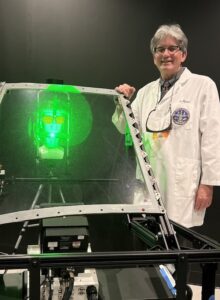
Story by Zachary Wilson
Naval Medical Research Unit Dayton
Dr. Michael Reddix, a senior research psychologist at Naval Medical Research Unit (NAMRU) Dayton, was named a winner of the Assistant Secretary of the Navy (Research, Development, and Acquisition) 2024 Dr. Delores M. Etter Top Scientist and Engineer Award on May 15.
This award, named for the former Assistant Secretary of the Navy for research, science, and technology Dolores M. Etter, recognizes individuals who have demonstrated exceptional technical excellence and made significant contributions to the Department of the Navy.
“It is a humbling feeling to be selected for an “individual’ accomplishment as the work I do in support of aircrew health and safety inevitably involves so many experts from diverse academic and technical fields,” Reddix said. “ If I have been impactful at all, I must credit not only my diverse teams and academic training (with thanks to my mentors) but also a Navy-sponsored directed-energy bioeffects Post-Doctoral Fellowship and 22 years of uniformed service as a Naval Aerospace Experimental Psychologist. Those experiences were critical in informing a deck-plate perspective of aerospace operating environments and related stressors that my research was tailored to address.”
Reddix and his team led the developing, field testing and acquiring of laser eye protection (LEP) spectacles. This initiative began with a U.S. Coast Guard requirement to create specialty eye protection systems to mitigate the risks pilots face from ground-based handheld laser pointers illuminating their cockpits.
NAMRU Dayton collaborated closely with the U.S. Air Force’s Air Force Research Laboratory (AFRL) on Wright-Patterson Air Force Base, Ohio, to evaluate these spectacles, leading to their growing availability for DoD mission partners and the larger commercial aviation industry. The eyewear allows continued visualization of cockpit instruments despite the laser threat. The team not only developed a state-of-the-art product specifically for the military, but also a variant for private aviators and the civilian airline industry, pending Federal Aviation Administration (FAA) approval.
“Our AFRL colleagues provided laser eye protection prototypes that were subsequently tested to meet laser eye protection and aviation human system integration requirements through a series of NAMRU Dayton laboratory vision psychophysics testing, to include night-vision goggle and cockpit avionics compatibility,” Reddix explained. “NAMRU Dayton and the U.S. Coast Guard conducted on-site fixed- and rotary-wing flight simulator tests, and, finally, the Coast Guard began their acquisition.”
A military-unique version of the laser eye protection is now available to the DoD and Coast Guard, while a civilian-approved variant designed for commercial aviation has been tested by the FAA with favorable results.
“Dr. Mike Reddix has been a superstar scientist for many years and is a pillar of research integrity and fount of knowledge here at NAMRU Dayton,” said Capt. Walter Dalitsch III, NAMRU Dayton commanding officer. “His passion for research and development is contagious, and his willingness to mentor and educate is already establishing the next generation of superstars. His receiving this award does not surprise me in the least – it is very, very well deserved!”
The announcement of Reddix’s selection for the award came in an official memo from Nikolas Guertin, the U.S. Navy Assistant Secretary for Research, Development, and Acquisition. Guertin expressed immense pride in recognizing the winners of this year’s awards, praising the awardees for their technical prowess and the substantial benefits their work has brought to the Navy.
“All awardees should be very proud of their accomplishments,” Guertin remarked in the memo. “The selection process for the award is notably rigorous, reflecting the high standards of professionalism and achievement expected within the Department of the Navy. Each nominee’s scientific and engineering feats are carefully evaluated to identify those who have truly distinguished themselves in their fields.”
Reddix attributes his ongoing success to the unique environment that NAMRU Dayton facilitates.
“The Naval Aerospace Medical Research Laboratory directorate of NAMRU Dayton has a ‘science and mission first’ work ethic that gives principal investigators a great deal of leeway in developing research teams and programs of record with sister services,” Reddix said. “These collaborations are essential, and have helped me excel as a scientist and research team leader.”
He also emphasized the importance of teamwork in achieving daily successes. “Our LEP program, that concluded with LEP acquisition, would not have been possible without these necessary and exceptionally rewarding team contributions,” he said. “It has truly been a privilege to support the naval aviation medical research and development enterprise.”
NAMRU DAYTON is home to the Naval Aerospace Medical Research Laboratory and Environmental Health Effects Laboratory on Wright-Patterson Air Force Base, Ohio. The Command optimizes the readiness, performance, and survivability of operational forces through environmental health effects, toxicology, and aerospace medical research and development, aiming to be the research lab of choice for enhancing human performance and protection in extreme environments.